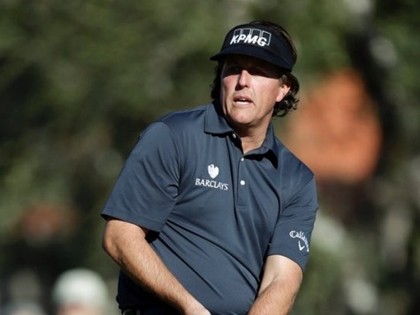Three days after golfer Phil Mickelson publicly said California’s high tax rate may force him to make “drastic changes” to his career or consider leaving the state he loves for financial reasons, he was bullied into apologizing for what Mickelson said were “insensitive comments.”
Mickelson issued an apology on Tuesday and, in his first remarks to reporters since his comments on Sunday, expressed deep regret on Wednesday at a press conference at Torrey Pines, CA, where this weekend’s PGA Tour event is being held.
Sports writers and others in the mainstream press resoundingly mocked Mickelson’s comments on Twitter the moment they came to light, even though Mickelson was not publicly advocating for lower tax rates or taking a political position. Mickelson–like many Californians have done since voters last November passed Proposition 30, which increased the tax rate on those making more than $250,000–was simply stating that California’s high and burdensome tax rate has caused him to think about potentially leaving the state for financial reasons. It is what fellow golfer Tiger Woods did in 1996.
Ron Sirak, in Golf Digest, wrote that Mickelson “was mostly pilloried in the social media for the comments he made about taxes on Sunday that burned up TV and the Internet on Monday and were scaled back by Mickelson on Tuesday in an apology.”
And much of the mocking came from sports journalists. ESPN’s Rick Reilly tweeted jokes about Mickelson’s private planes and butlers wanting to join unions. Jack McCallum, who wrote for Sports Illustrated, for three decades, said, “Phil’s back must be aching from the attaboys he received from his fellow golfing millionaires.” Others sarcastically mentioned that KPMG sponsors Mickelson and should have no problem finding him tax shelters. University professors wrote articles telling Mickelson to stop whining.
Because of this derision–and the pressure that some of his sponsors may have felt–Mickelson immediately backtracked.
On Wednesday, Mickelson said his comments were as “way right” as his drive on the 18th tee at the 2006 U.S. Open at Winged Foot was “way left.”
“I shouldn’t take advantage of the forum I have as a professional golfer to try to ignite change over these issues,” Mickelson said, almost sheepishly. “I made a big mistake talking about this publicly and I shouldn’t have done that.”
When reporters told Mickelson that he did not say anything wrong and simply expressed that he–like most Americans–do not like paying higher taxes, Mickelson just emphasized that his comments should never have been made public.
He said it was “insensitive” to talk about how high taxes may force him to make “drastic changes” when people were unemployed and having trouble finding jobs in this economy.
He reiterated that he “should not have brought it up at all” and was happy to pay taxes in America because of the opportunities the country has afforded him.
“I have never had a problem paying my fair share,” Mickelson said, sounding like he was reading a script given to him from someone in President Barack Obama’s speechwriting team, before acknowledging he did not know what his “fair share” was right now.
Sirak, the veteran Golf Digest writer, echoing a sentiment among many in the mainstream sports press, wrote that the “restrained display by Mickelson on Tuesday and Wednesday is what was needed on Sunday.”
“There’s no doubt in my mind that Phil hasn’t suddenly become a Lefty on taxes, but he now realizes there is little to be gained by being openly Right,” Sirak wrote. “It took Mickelson years–and 46 failed tries in the majors–before he learned that self control and caution is what wins the big tournaments. Perhaps now he has learned that’s a good path to follow in non-golf matters as well.”
Sirak concluded: “Going public with your opinions is a right, but it can come at a price when you live your life on a public stage.”
But this only applies to opinions that are considered “conservative” rather than those that are “way left.” When athletes–or professional leagues–advocate for liberal causes like climate change or gay marriage, the sports press does not call for “restraint.”
The NBA has a “green initiative,” and Lakers guard Steve Nash, who is from Canada, is featured as part of the campaign. In 2009, the NBA launched its “Green Week,” and Adidas outfitted NBA teams with “100 percent organic cotton Adidas shooting shirts featuring the NBA Green logo.”
“The NBA is taking steps to become a more environmentally-friendly organization and will continue to explore ways of improving in this area,” the league said then. “NBA Green Week 2009 serves as a reminder for fans that each of us can help to reduce our environmental footprint and that every bit helps.”
When professional skiers and snowboarders discussed the threat of climate change, ESPN–and other outlets–ran generally positive features. So did liberal magazines like Mother Jones.
Minnesota Vikings punter Chris Kluwe and Baltimore Ravens linebacker Brendon Ayanbadejo were named GQ magazine’s “honorary gays” and praised for taking a stance on Maryland’s gay marriage initiative, which passed last year. Ayanbadejo said it felt like Christmas morning when the initiative passed, and there were hardly any complaints from the mainstream sports media about his blatant political activism.
The mainstream press largely praised the Miami Heat for wearing hoodies after the death of Trayvon Martin last year, even as the media was falsely vilifying George Zimmerman as a racist who had been intent on targeting a black teenager.
But when Mickelson makes a comment about how California’s high tax rate may force him to make “changes,” he is pilloried and forced to walk back comments that even Tim Finchem, the PGA Commissioner who was an economist in liberal Jimmy Carter’s presidential administration, said were “not unique.”

COMMENTS
Please let us know if you're having issues with commenting.